 Petzlover
Petzlover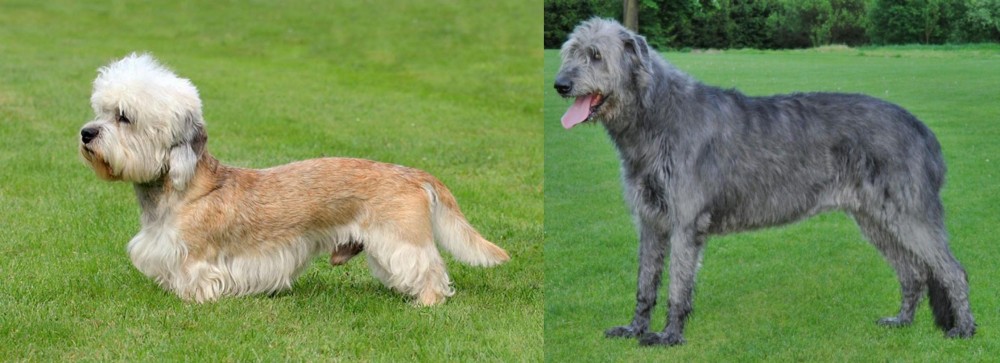 Dandie Dinmont Terrier is originated from United Kingdom but Irish Wolfhound is originated from Ireland. Dandie Dinmont Terrier may grow 58 cm / 22 inches shorter than Irish Wolfhound. Dandie Dinmont Terrier may weigh 43 kg / 94 pounds lesser than Irish Wolfhound. Dandie Dinmont Terrier may live 5 years more than Irish Wolfhound. Both Dandie Dinmont Terrier and Irish Wolfhound has almost same litter size. Both Dandie Dinmont Terrier and Irish Wolfhound requires Moderate Maintenance.
Dandie Dinmont Terrier is originated from United Kingdom but Irish Wolfhound is originated from Ireland. Dandie Dinmont Terrier may grow 58 cm / 22 inches shorter than Irish Wolfhound. Dandie Dinmont Terrier may weigh 43 kg / 94 pounds lesser than Irish Wolfhound. Dandie Dinmont Terrier may live 5 years more than Irish Wolfhound. Both Dandie Dinmont Terrier and Irish Wolfhound has almost same litter size. Both Dandie Dinmont Terrier and Irish Wolfhound requires Moderate Maintenance.
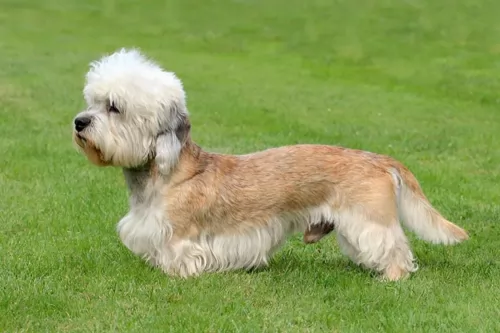 The rough coated Dandie Dinmont Terrier originates from Scotland. They were used centuries ago for hunting otters and badgers.
The rough coated Dandie Dinmont Terrier originates from Scotland. They were used centuries ago for hunting otters and badgers.
There are theories that exist that the dog is a cross between Scottish- and Skye Terriers while others believe there must be some Dachshund in the mix because of the long body of the Dandie Dinmont Terrier.
The Dandie Dinmont Terrier was first recorded as a distinct breed in the late 1600s. The British Dandie Dinmont Terrier Club was formed in 1875 while the American Kennel Club recognized the Dandie in 1886.
 It is believed that the Irish Wolfhound is an ancient breed and that it was brought to Ireland as early as 7000 BC.
It is believed that the Irish Wolfhound is an ancient breed and that it was brought to Ireland as early as 7000 BC.
These dogs were bred as hunting dogs as well as guard dogs. There was a time when these huge canines were only allowed to be owned by the nobility. The breed died out somewhat, but Scotsman Captain George Augustus Graham made efforts to restore the breed’s numbers.
Captain Graham devoted his life to making sure the Irish Wolfhound’s numbers were built up, and the breeding program included Great Danes, Borzois, English Mastiffs and Scottish Deerhounds.
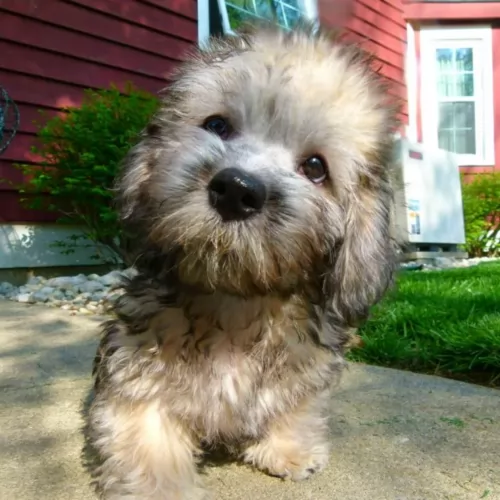 The Dandie Dinmont Terrier is a small dog who stands between 20 – 28cm at the withers and weighs between 8 and 11kg. He is recognizable by his fluffy head of hair.
The Dandie Dinmont Terrier is a small dog who stands between 20 – 28cm at the withers and weighs between 8 and 11kg. He is recognizable by his fluffy head of hair.
He actually has quite a unique look with his long body and slightly over-sized head. He has floppy ears and a long tail. His coat is quite unusual too in that it can be silky and long around the face, legs and belly, while the topcoat is fairly shortish and crisp. His coat color is fawn to brown or reddish. He isn’t a heavy shedder.
Known also as the Dandie, Charlie’s Hope Terrier, the Mustard and Pepper Terrier, the Dandie Dinmont makes an excellent family pet with his calm demeanor, being somewhat reserved around strangers.
He is an alert, intelligent little dog and will warn you of strangers coming into your space. He therefore makes a good watchdog. He is loving and loyal to his human family and will readily fit into life in the city or in the countryside.
They are good with children and pets but with his independent streak, he will require training and socialization if you want him to behave and be obedient.
 The tallest of the sighthounds, the Irish Wolfhound looks like a large Greyhound, only he has a rough, wiry type of coat.
The tallest of the sighthounds, the Irish Wolfhound looks like a large Greyhound, only he has a rough, wiry type of coat.
He is also gracefully built and known as a gentle giant. The double coat which can be fawn, red, white, grey, black or brindle is straight to wavy.
He stands at about 81 to 86cm and weighs roughly 48 to 54kg. This is one of the few dog breeds that you can’t really call social. He loves his own human family, and becomes unhappy and ‘down-in-the-dumps’ when separated from his family members for too long. He is a quiet dog who tends to be somewhat introverted and reserved, while being highly intelligent.
He will require being trained and socialized to make him obedient as he is an independent dog. He takes his role as family protector seriously and even though he is quiet, he is ready to take on anyone who threatens his property.
The Irish Wolfhound is a gentle, quiet, soft-natured, easy-going dog and even though it is such a large dog, it doesn’t throw it’s weight around but is calm and patient around the elderly and children in the home. It can tend to be aggressive with animals he isn’t familiar with.
He is an intelligent dog, but even so he may be quite resistant to training as he is strong-willed and determined to have his own way. These dogs need to be trained and socialized otherwise they just do their own thing.
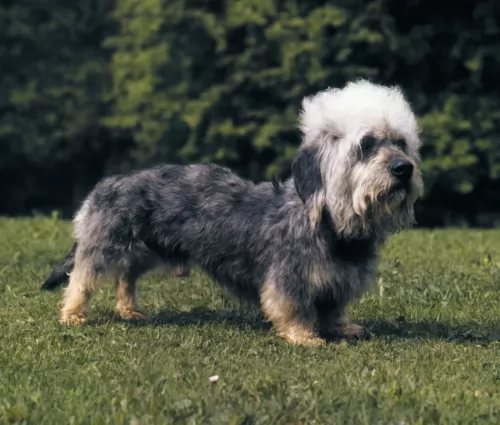 Your Dandie Dinmont is capable of being a wonderful companion. He loves spending time with his human family and is affectionate and loyal.
Your Dandie Dinmont is capable of being a wonderful companion. He loves spending time with his human family and is affectionate and loyal.
The small Dandie is able to fit into life in the city or country, just so long as he has his human family with him. Because he comes from Terrier dogs, he is no push-over though and he has an independent streak which will benefit from training and socialization.
Make sure you give this small dog of yours plenty of love and good care and you will find that you have a loyal, devoted friend in him.
 The most notable aspect of the Irish Wolfhound is his amazing height. The legs are long, the body narrow. He is gentle and easy-going but because he is a sighthound he loves to give chase after animals.
The most notable aspect of the Irish Wolfhound is his amazing height. The legs are long, the body narrow. He is gentle and easy-going but because he is a sighthound he loves to give chase after animals.
He is capable of living in the city or countryside, but your home will need to cater to his size. He isn’t particularly energetic, enjoying a quiet life but he will absolutely need to be exercised.
Provide your gentle giant with everything needed to make him content, and you’ll have a faithful, loving friend for about 10 years.
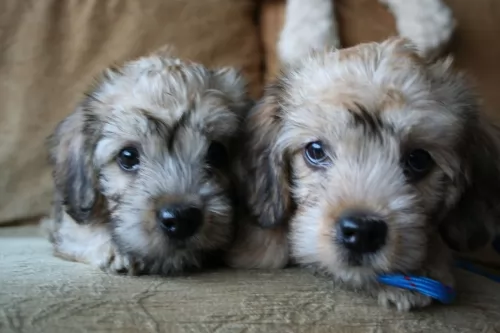 Your pet Dandie Dinmont is a robust little dog who, with good care, can live to be anything between 12 to 15 years of age.
Your pet Dandie Dinmont is a robust little dog who, with good care, can live to be anything between 12 to 15 years of age.
With every dog breed there will be health concerns, and these can include illnesses such as epilepsy as well as hypochondroplasia. All dogs have the potential to fall prey to health problems, and getting your pet from a reputable breeder can help to ensure you eliminate some of these diseases.
This small dog has a long body which means he can be affected by spinal problems. Genetics and body shape play a large role. Intervertebral disc disease is a condition where the cushioning discs between the vertebrae of the spinal column herniate into the spinal cord space. The discs press on the nerves and pain and paralysis can follow.
 One wonders why breeders seem so bent on breeding such large dogs when they have health issues and they don't live particularly long. Not only do they cost a fortune to feed, but large dogs like this are more prone to illnesses and won’t live as long as small dog breeds. This big dog can live up to 10 years of age or so.
One wonders why breeders seem so bent on breeding such large dogs when they have health issues and they don't live particularly long. Not only do they cost a fortune to feed, but large dogs like this are more prone to illnesses and won’t live as long as small dog breeds. This big dog can live up to 10 years of age or so.
For starters, just because he is a deep chested dog, bloat or gastric torsion can be a threat. Other illnesses to look out for are dilated cardiomyopathy and bone cancer.
This is a disease of the heart muscle where the enlarged heart won’t function properly. The upper- and lower chambers of the heart are enlarged and the heart isn’t able to pump blood out properly. When the heart’s ventricle doesn’t pump enough blood into the lungs, fluid accumulates in the lungs and this ultimately leads to congestive heart failure.
Older dogs battle more with this heart disease and it is also more common in some dog breeds of which the Irish Wolfhound is one. Your dog will have shortness of breath, coughing and abdominal distension. He will need to get to the vet for medical tests.
Bone cancer can strike any dog, but you’ll find in more commonly with larger dog breeds. It can spread quickly and the long term prognosis isn’t good. It’s not easy to pick the disease up and it can mean joint pain for your pet and even lameness.
Your dog will be tired too. Your vet will do X-rays and other tests, but unfortunately the prognosis isn’t usually good. Big-dog breeders should take this into consideration.
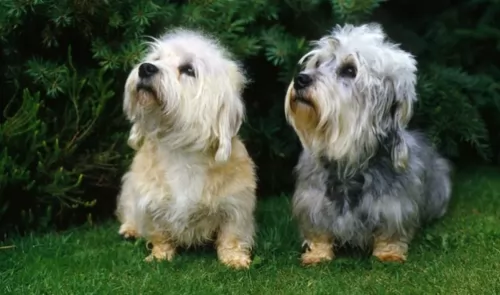 The Dandie doesn’t require as much exercise as some other dog breeds but you want to make sure he goes with you on your walks, or you play ball with him in the garden. You don’t want to see a small dog like this becoming obese as it can herald in a host of health problems.
The Dandie doesn’t require as much exercise as some other dog breeds but you want to make sure he goes with you on your walks, or you play ball with him in the garden. You don’t want to see a small dog like this becoming obese as it can herald in a host of health problems.
The Dandie Dinmont Terrier doesn’t shed a hang of a lot but still, you will need to brush him twice a week to get rid of those loose hairs. Also, the coat will require stripping twice a year. Some dog owners who prefer a low maintenance breed might not like knowing this, but it is a necessary part of his grooming. There are some dog owners who cut the hair rather, but then the texture of the coat will change. This is only important to know if you want to show your Dandie. Other Dandie owners take their pets to a professional groomer for clipping.
Because the Dandie has floppy ears and a lot of hair around the face and ears, you will need to check his ears for dirt and wax build-up as these can cause an ear infection. If you’re nervous to be going inside your dog’s ears, the vet or the dog groomer can show you how.
Also, little dogs like this are prone to tooth decay, and you will need to brush his teeth 2 or 3 times a week. This is because plaque and tartar buildup can cause mouth infections which contribute to other diseases within the body.
 This isn’t a particularly energetic dog and he can tend to become lazy. Don’t allow this as becoming unfit and overweight can be very bad for such large dog. Being so large already puts stress on the dog’s body, and the dog is already susceptible to cardiac and skeletal problems. Allowing him to become lazy and overweight will be a death sentence for this large dog. It is imperative to make sure you take him on walks and play games with him.
This isn’t a particularly energetic dog and he can tend to become lazy. Don’t allow this as becoming unfit and overweight can be very bad for such large dog. Being so large already puts stress on the dog’s body, and the dog is already susceptible to cardiac and skeletal problems. Allowing him to become lazy and overweight will be a death sentence for this large dog. It is imperative to make sure you take him on walks and play games with him.
The coat of your dog is thick and medium length and he will require being brushed at least twice a week. You may want to also trim the longer hair you find around his face and legs.
When it comes to his ears, you can moisten some cotton wool and wipe the inside of his ears to remove dirt and excess wax. Remember not to probe too deeply to avoid damaging the ear. If you’re uncertain how to do this, your vet can explain to you how its done.
Check his teeth regularly as dental disease can affect other areas of the body too. Don’t allow his nails to get too long as they can cause paw problems and the nails can hook onto things and cause injury.
Because this is a giant breed, the puppy will grow for a long time. Speak to your vet about how to ensure you feed your puppy in such a way that he doesn’t grow too quickly.
If you feed your dog a commercially manufactured food, make sure its one of the top quality brands. Include home-made cooked food such as chicken, rice and vegetables into his kibble from time to time, and also try to feed him some raw meat occasionally.
Fresh, cool water must be available to your Irish Wolfhound around the clock.